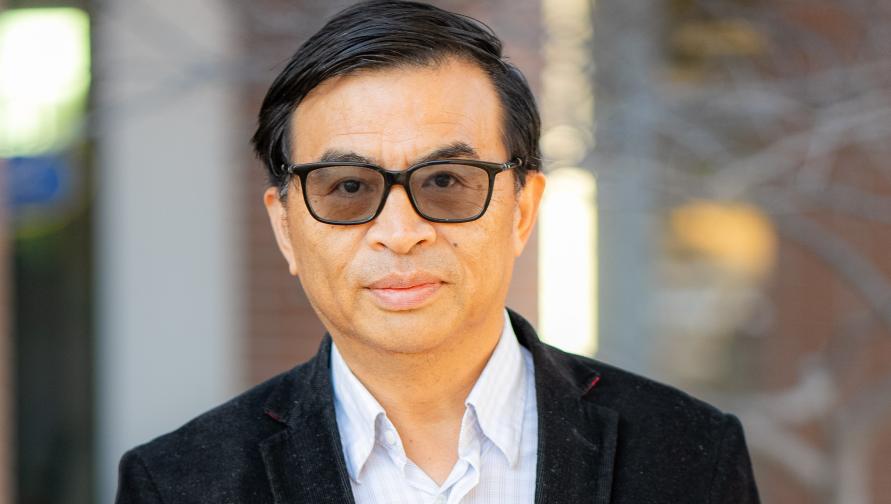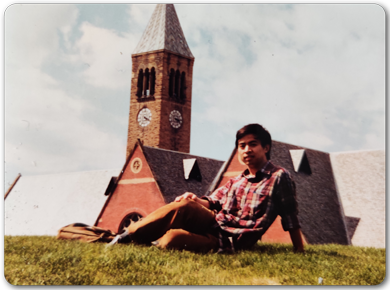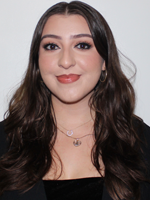
In Summer 2023, School of Humanities first-generation students interviewed first-generation humanities faculty to learn about their experiences and the different professional and personal paths they traveled on their way to UCI.

Enshi > Beijing > Ithaca > Irvine
In this interview, Chelsea Salinas (B.A., History, ‘23) speaks with Professor Yong Chen (History) about his journey from a very remote village in China to UCI, where he teaches history and serves as the Associate Dean for Curriculum and Student Services.
Chelsea: When did you first recognize that you were a first-gen student? And how did that change your perspective of college?
Yong: That's a very good question. I came from China, so I am an international student. "First-gen" is a fairly new concept, especially for my generation, who went to college in the late 1970s to early 80s.
I came from a small town in China, surrounded by mountains. And it's basically pretty much cut off from the rest of the country – and the rest of the world for sure. The time period in which I went to college was also during the end of the Cultural Revolution. When I went to college, China had just started slowly to open up, including its colleges and universities.
I went to Beijing University. And that was the first time I stepped out of the boundaries of the province. So I was overwhelmed. You know, I couldn't even find my classrooms on the first day of class. I was 17. And I was just overwhelmed. And the tears started to come up. And I was not scared – I was just very excited. It's an overwhelming experience, with a lot of exploring to do.
C: Did your family ever talk to you about college?
Y: Yes. But it’s also been in the history of China. For more than 1,000 years, education has been the most important vehicle for social upward mobility in China. It has helped people to come out of their class background, and also out of physically isolated spaces, in order to know the world better. I saw the opportunity of education at the end of the Cultural Revolution, when doors to higher education began to open. So I think that higher education has worked the same way in the U.S., too. It has opened doors for people who do not come from well-educated and wealthy backgrounds.
The responsibility to succeed
C: Being that higher education was so important, did you ever feel a responsibility or pressure to succeed?
Y: Oh, yes. In traditional societies, like China, there is a lot of peer pressure – from the people around you and your family. But more often from the community, a sort of invisible pressure. For example, if I am able to go to the best university in China, I have to succeed. There's no other way. You have to make it. Otherwise people will say, “Hey, look at that guy. He didn't make it.”
Similarly to when I came to the U.S. You have to succeed. You cannot say, "Oh it's too hard and it's a foreign culture, or I’m using a foreign language every day, let me just go back." What would you do when you go back?
In a way, I'm old-fashioned, perhaps. I guess that when there is a lot of pressure, it's hard to deal with. Too much pressure could hurt you. But pressure is also a way to motivate you, right? It varies from individual to individual, and from generation to generation. But I think a lot of us in my generation share that philosophy.
All the people that I know who went to Beijing University graduated, and everyone did very well. But they went through a highly selective process to get there. And at Cornell, where I went to grad school, the people who went there from China mostly went into the sciences. But many of us knew each other fairly well, and many of us remain friends to this day. They all shared the same kind of pressure that I had, but with few institutional resources to help us. And what's important is that we supported each other.
There are a lot of resources on this campus (and also many other campuses), and people should take advantage of those resources. At the same time, the traditional support network – your loved ones, your friends and all sorts of people who go to college at the same time with you – are a network that you should take advantage of as well.
Resources at UC Irvine
C: Speaking of resources, are there any resources here at UC Irvine that you feel are underutilized by students?
Y: That's another very good question. So it depends what you mean by underutilized. I think for certain individuals and groups, a lot of resources are underutilized. One important resource is faculty office hours. Every week, for a couple of hours, faculty make themselves available. Students are welcome to go. And a lot of students just don't go, and for understandable reasons, in most cases. Students are very busy. A lot of our students have family responsibilities, and they have to pay the tuition themselves so they have to work.
But we also have other resources: advising at the advising office. I know a lot of people use that resource as well as the Writing Center, including international students. But I'm sure some other students who need writing support don't use it, either because they're not aware of it, or they don't have the time.
Sometimes people are a little intimidated, as you mentioned, and then for first-gen students, they're not sure if faculty would like to talk to them. I think the campus, the faculty and the schools need to do a better job making students aware of the resources. As you know, we also offer mental health services at the Counseling Center. International students have the International Center. Sometimes we just need to make the extra effort to look at their website and physically visit their office. Effort can make a lot of difference.
Students also have opportunities to study abroad. We have a very good study abroad center at UCI and we also have another organization called UROP. Are you aware of that? Even active students like yourself are often not aware that UROP provides funding for students to do some research on their own and receive mentorship in the process.
Don’t be afraid to go to office hours
C: You spoke a little bit about office hours and I've talked to two other first-gen professors now who've also recommended office hours. But what I've noticed with other first gen students is it's kind of just the first step is getting there. And that's the hardest part. But do you have any advice about what to say once you get into office hours?
Y: Okay, yes. So I also work with international students on this campus as a faculty director of a program called the International Student Excellence Program. And before the pandemic we tried to address that issue, because it's a wide-spread phenomenon among a lot of students. They're too busy. And then they felt intimidated. So we tried to pair a student with a peer mentor, to go with them to talk to their professor during office hours. One of the first things that came up is: what do you say when you go there? And so we tried to tell them to just make that initial effort. It's very critical. And it's usually very fruitful, both for the professor and for the student.
Go see one of the professors whose class you're taking. You can say, "I took your U.S. food history class, and I have some questions about boba tea (because I love boba tea). And is that a valid topic for historical research? If it is, why?" Or you can go to office hours and tell the professor, "Oh, I really enjoyed the class." That'd be fine, too, right? That's also good feedback for the professor to know. Or you can ask the professor, "When you lecture, can you slow down a little bit?" Once you get there, you will have plenty to talk about.
C: What advice would you give to other first-gen students that you wish you had known in college?
Y: Talk to professors and also talk to your peers – including peers within your major who are upperclassmen. And find out what the interesting classes are, why they chose the major, how they developed their interest in a particular area or topic. So talk to the people in your major in your program. At the same time, college is a great time to explore, to find out about yourself and find out about the world. So I would also encourage students to talk to people and professors outside your major. You never know – a math major may realize, okay, I actually find history more fascinating. And so I'm going to take more history classes, or attend a few guest lectures or events. And then you could either switch your major, or you could choose to double major. Don't simply stay within your comfort zone, in the relatively isolated world that each of us feel comfortable in.
Finding your passion is a lifetime mission
C: You brought up discovering your interests and passions. How did you discover your passions, and do you have any advice around this?
Y: Yeah, well, it's a lifetime mission. It only ends when we leave this world. I think it's different for everyone, though. For people of my generation, the most important motivation, or pressure, is to survive. For me especially, it’s to be able to get out of isolated spaces, in terms of the physical surroundings, but also in terms of knowledge. And to a certain degree, that's good, because that keeps you going.
When immigrants arrive in the U.S., their number one priority is to survive. And so to explore is a luxury. For my children, for college students who have some support from their parents, then they know the culture very well. Even first-gen students should take advantage of their cultural capital, and then try to broaden their educational horizons and explore. It's a luxury but it's also a wonderful opportunity. I do understand the tremendous pressure on a lot of first-gen students. You often have family responsibilities. But still, at least in the U.S., the culture, the society, the country and the language is not foreign. It's not a foreign country. So just whatever advantage you have and however limited it may be, try to maximize it and take advantage of what you can. College is a very transformative period in our life. And it's a great opportunity to find out about our passions. But then we need to make the effort. We need to have the courage to explore and to take advantage of it.
C: Thank you so much for talking with me.
Y: Thank you. Thank you. These are very, very good questions. It’s important for faculty to talk to each other about how to support first-gen students. But I would like to also encourage first-gen students like yourself to help each other and to let us know what we (faculty) can do. So that we can work together to make UCI a better place for first-gen students and for everyone.

Chelsea Salinas graduated from UC Irvine in 2023. Her major was history, with a specialization in teaching.
